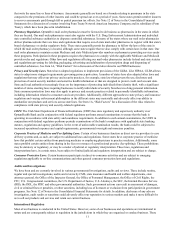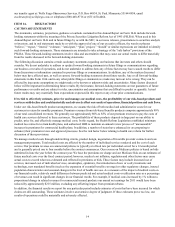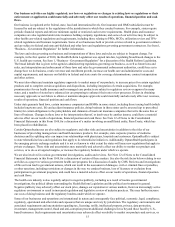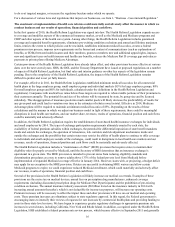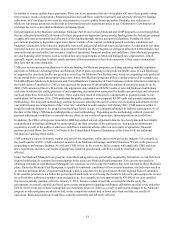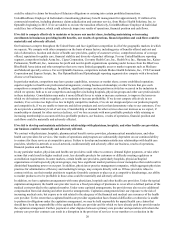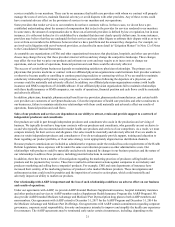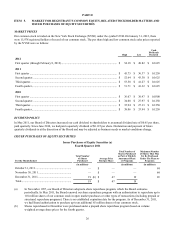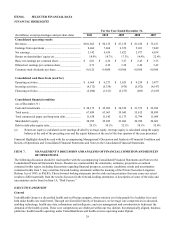United Healthcare 2011 Annual Report Download - page 23
Download and view the complete annual report
Please find page 23 of the 2011 United Healthcare annual report below. You can navigate through the pages in the report by either clicking on the pages listed below, or by using the keyword search tool below to find specific information within the annual report.21
services available to our members. There can be no assurance that health care providers with whom we contract will properly
manage the costs of services, maintain financial solvency or avoid disputes with other providers. Any of these events could
have a material adverse effect on the provision of services to our members and our operations.
Some providers that render services to our members do not have contracts with us. In those cases, we do not have a pre-
established understanding about the amount of compensation that is due to the provider for services rendered to our members.
In some states, the amount of compensation due to these out-of-network providers is defined by law or regulation, but in most
instances, it is either not defined or it is established by a standard that does not clearly specify dollar terms. In some instances,
providers may believe that they are underpaid for their services and may either litigate or arbitrate their dispute with us or try to
recover from our members the difference between what we have paid them and the amount they charged us. For example, we
are involved in litigation with out-of-network providers, as described in more detail in “Litigation Matters” in Note 12 of Notes
to the Consolidated Financial Statements.
Accountable care organizations (ACOs) and other organizational structures that physicians, hospitals, and other care providers
choose may change the way that these providers interact with us and may change the competitive landscape. These changes
may affect the way that we price our products and estimate our costs and may require us to incur costs to change our
operations, and our results of operations, financial position and cash flows could be adversely affected.
The success of certain Optum businesses depends on maintaining satisfactory physician relationships. The primary care
physicians that practice medicine or contract with our affiliated physician organizations could terminate their provider contracts
or otherwise become unable or unwilling to continue practicing medicine or contracting with us. If we are unable to maintain
satisfactory relationships with primary care physicians, or to retain enrollees following the departure of a physician, our
revenues could be materially and adversely affected. In addition, our affiliated physician organizations contract with health
insurance and HMO competitors of UnitedHealthcare. If our affiliated physician organizations fail to maintain relationships
with these health insurance or HMO companies, our results of operations, financial position and cash flows could be materially
and adversely affected.
In addition, physicians, hospitals, pharmaceutical benefit service providers, pharmaceutical manufacturers, and certain health
care providers are customers of our Optum businesses. Given the importance of health care providers and other constituents to
our businesses, failure to maintain satisfactory relationships with them could materially and adversely affect our results of
operations, financial position and cash flows.
Sales of our products and services are dependent on our ability to attract, retain and provide support to a network of
independent producers and consultants.
Our products are sold in part through independent producers and consultants who assist in the production and servicing of
business. We typically do not have long-term contracts with our producers and consultants, who generally are not exclusive to
us and who typically also recommend and/or market health care products and services of our competitors. As a result, we must
compete intensely for their services and allegiance. Our sales would be materially and adversely affected if we are unable to
attract or retain independent producers and consultants or if we do not adequately provide support, training and education to
them regarding our product portfolio, or if our sales strategy is not appropriately aligned across distribution channels.
Because producer commissions are included as administrative expenses under the medical loss ratio requirements of the Health
Reform Legislation, these expenses will be under the same cost reduction pressures as other administrative costs. Our
relationships with producers could be materially and adversely impacted by changes in our business practices and the nature of
our relationships to address these pressures, including potential reductions in commissions.
In addition, there have been a number of investigations regarding the marketing practices of producers selling health care
products and the payments they receive. These have resulted in enforcement actions against companies in our industry and
producers marketing and selling these companies' products. For example, CMS and state departments of insurance have
increased their scrutiny of the marketing practices of producers who market Medicare products. These investigations and
enforcement actions could result in penalties and the imposition of corrective action plans, which could materially and
adversely impact our ability to market our products.
Our relationship with AARP is important and the loss of such relationship could have an adverse effect on our business
and results of operations.
Under our agreements with AARP, we provide AARP-branded Medicare Supplement insurance, hospital indemnity insurance
and other products and services to AARP members under a Supplement Health Insurance Program (the AARP Program). We
also provide AARP-branded Medicare Advantage and Medicare Part D prescription drug plans to both AARP members and
non-members. Our agreements with AARP extend to December 31, 2017 for the AARP Program and December 31, 2014 for
the Medicare Advantage and Medicare Part D offerings. Our agreements with AARP contain commitments regarding corporate
governance, corporate social responsibility, diversity and measures intended to improve and simplify the health care experience
for consumers. The AARP agreements may be terminated early under certain circumstances, including, depending on the


